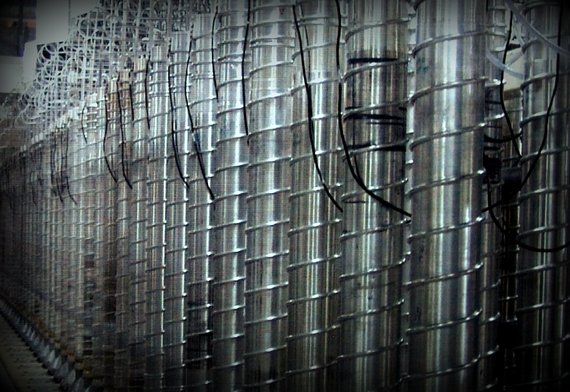The perverse genius of Benjamin Netanyahu and his aides (and their Republican handmaidens) is that they have managed to turn a moment in which President Obama should have been busy defending his pursuit of a nuclear agreement with a dangerous adversary into a stress test of the U.S.-Israel relationship.
But on Wednesday, the day after Netanyahu delivers his reelection speech to Congress to 23, or 19, or 31 standing ovations (advice to viewers: study the Democrats as they arrange their facial expressions in complicated and interesting ways), the focus will return to the president, his plans for the Middle East, and the many promises he has made about Iran and its nuclear program.
I’m fairly sure Netanyahu will deliver a powerful speech, in part because he is eloquent in English and forceful in presentation. But there is another reason this speech may be strong: Netanyahu has a credible case to make. Any nuclear agreement that allows Iran to maintain a native uranium-enrichment capability is a dicey proposition; in fact, any agreement at all with an empire-building, Assad-sponsoring, Yemen-conquering, Israel-loathing, theocratic terror regime is a dicey proposition.
The deal that seems to be taking shape right now does not fill me—or many others who support a diplomatic solution to this crisis—with confidence. Reports suggest that the prospective agreement will legitimate Iran’s right to enrich uranium (a “right” that doesn’t actually exist in international law); it will allow Iran to maintain many thousands of operating centrifuges; and it will lapse after 10 or 15 years, at which point Iran would theoretically be free to go nuclear. (The matter of the sunset clause worries me, but I’m more worried that the Iranians will find a way to cheat their way out of the agreement even before the sun is scheduled to set.)
Obama’s greatest argument against Netanyahu is simple and dispositive: The Israelis have not offered a better solution to the Iranian challenge. But the fact that Netanyahu has no actual ideas—other than strategies that lead to endless sanctions of diminishing effectiveness and bombing runs of similarly dubious long-term effectiveness—does not absolve the Obama administration of its responsibility to secure the toughest deal possible.
This is a very dangerous moment for Obama and for the world. He has made many promises, and if he fails to keep them—if he inadvertently (or, God forbid, advertently) sets Iran on the path to the nuclear threshold, he will be forever remembered as the president who sparked a nuclear-arms race in the world’s most volatile region, and for breaking a decades-old promise to Israel that the United States would defend its existence and viability as the nation-state of the Jewish people.
In an interview with me three years ago, President Obama said he was motivated to prevent Iran from obtaining a nuclear weapon in part because he worried that a nuclear Iran would cause its many Middle East rivals to pursue their own nuclear programs.
“It will not be tolerable to a number of states in that region for Iran to have a nuclear weapon and them not to have a nuclear weapon,” he said. “Iran is known to sponsor terrorist organizations, so the threat of proliferation becomes that much more severe.” He went on, “The only analogous situation is North Korea. We have applied a lot of pressure on North Korea as well and, in fact, today found them willing to suspend some of their nuclear activities and missile testing and come back to the table. But North Korea is even more isolated, and certainly less capable of shaping the environment (around it) than Iran is. And so the dangers of an Iran getting nuclear weapons that then leads to a free-for-all in the Middle East is something that I think would be very dangerous for the world.”
If Saudi Arabia, Egypt, and Turkey respond to an Iran nuclear agreement by ramping up their own nuclear programs, we may be able to judge the deal a provisional failure.
On Israel, here’s the promise Obama made that stays with me the most: “I think that the Israeli government recognizes that, as president of the United States, I don’t bluff,” he said. “I also don’t, as a matter of sound policy, go around advertising exactly what our intentions are. But I think both the Iranian and the Israeli government recognize that when the United States says it is unacceptable for Iran to have a nuclear weapon, we mean what we say.” He went on to say four words that have since become famous: “We’ve got Israel’s back.”
Netanyahu obviously believes that Obama doesn’t have his, or Israel’s, back. There will be no convincing Netanyahu that Obama is anything but a dangerous adversary. But if a consensus forms in high-level Israeli security circles (where there is a minimum of Obama-related hysterics) that the president has agreed to a weak deal, one that provides a glide path for Iran toward the nuclear threshold, then we will be able to say, fairly, that Obama’s promises to Israel were not kept. One of Netanyahu’s most strident critics, Meir Dagan, the former head of the Mossad intelligence agency, said recently, “A nuclear Iran is a reality that Israel won’t be able to come to terms with.”
He went on to say, “Two issues in particular concern me with respect to the talks between the world powers and Iran: What happens if and when the Iranians violate the agreement, and what happens when the period of the agreement comes to an end and they decide to pursue nuclear weapons?”
In the coming weeks, President Obama must provide compelling answers to these questions.









